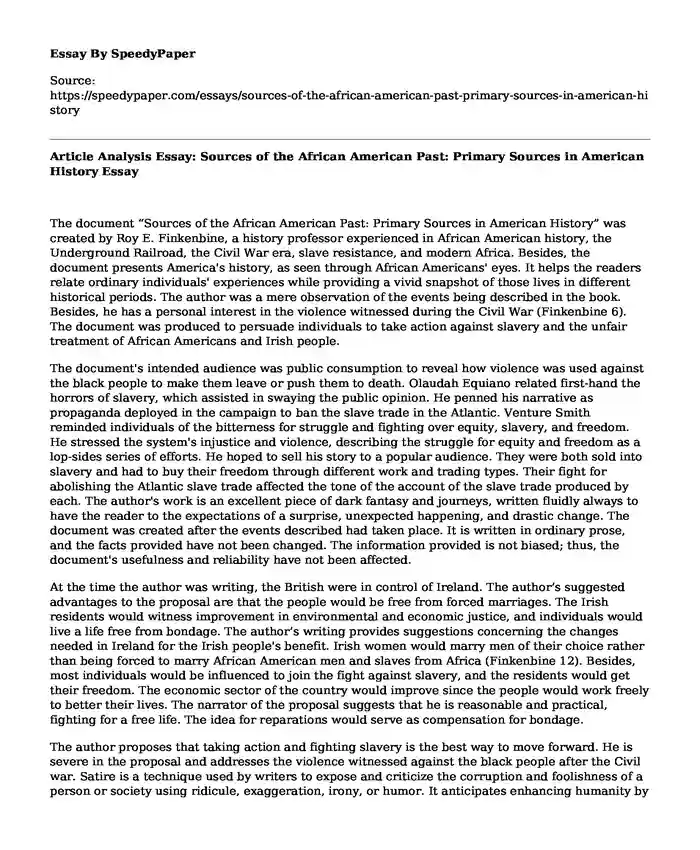
| Type of paper: | Essay |
| Categories: | Slavery American history |
| Pages: | 3 |
| Wordcount: | 680 words |
The document “Sources of the African American Past: Primary Sources in American History” was created by Roy E. Finkenbine, a history professor experienced in African American history, the Underground Railroad, the Civil War era, slave resistance, and modern Africa. Besides, the document presents America's history, as seen through African Americans' eyes. It helps the readers relate ordinary individuals' experiences while providing a vivid snapshot of those lives in different historical periods. The author was a mere observation of the events being described in the book. Besides, he has a personal interest in the violence witnessed during the Civil War (Finkenbine 6). The document was produced to persuade individuals to take action against slavery and the unfair treatment of African Americans and Irish people.
The document's intended audience was public consumption to reveal how violence was used against the black people to make them leave or push them to death. Olaudah Equiano related first-hand the horrors of slavery, which assisted in swaying the public opinion. He penned his narrative as propaganda deployed in the campaign to ban the slave trade in the Atlantic. Venture Smith reminded individuals of the bitterness for struggle and fighting over equity, slavery, and freedom. He stressed the system's injustice and violence, describing the struggle for equity and freedom as a lop-sides series of efforts. He hoped to sell his story to a popular audience. They were both sold into slavery and had to buy their freedom through different work and trading types. Their fight for abolishing the Atlantic slave trade affected the tone of the account of the slave trade produced by each. The author's work is an excellent piece of dark fantasy and journeys, written fluidly always to have the reader to the expectations of a surprise, unexpected happening, and drastic change. The document was created after the events described had taken place. It is written in ordinary prose, and the facts provided have not been changed. The information provided is not biased; thus, the document's usefulness and reliability have not been affected.
At the time the author was writing, the British were in control of Ireland. The author’s suggested advantages to the proposal are that the people would be free from forced marriages. The Irish residents would witness improvement in environmental and economic justice, and individuals would live a life free from bondage. The author’s writing provides suggestions concerning the changes needed in Ireland for the Irish people's benefit. Irish women would marry men of their choice rather than being forced to marry African American men and slaves from Africa (Finkenbine 12). Besides, most individuals would be influenced to join the fight against slavery, and the residents would get their freedom. The economic sector of the country would improve since the people would work freely to better their lives. The narrator of the proposal suggests that he is reasonable and practical, fighting for a free life. The idea for reparations would serve as compensation for bondage.
The author proposes that taking action and fighting slavery is the best way to move forward. He is severe in the proposal and addresses the violence witnessed against the black people after the Civil war. Satire is a technique used by writers to expose and criticize the corruption and foolishness of a person or society using ridicule, exaggeration, irony, or humor. It anticipates enhancing humanity by criticizing its foibles and follies. Writers deploy satire to condemn and expose corruption in society. Authors may use cartoons to criticize the actions of political figures in a comical manner. Satire is used as a tool to share ideas and opinions on human nature, slavery, and other concerns that afflicted American society during a specific period. It ridicules and criticizes the vices in society that authors consider to be a threat to civilization. The authors believe it their obligation to expose the wrongs for the betterment of humanity. They anticipate to warn the public and transform individuals' opinions concerning conditions and corruption in society.
Work Cited
Finkenbine, Roy. Sources of the African American Past: Primary Sources in American History. 2nd ed., Pearson/Longman, 2004.
Cite this page
Article Analysis Essay: Sources of the African American Past: Primary Sources in American History. (2023, Dec 30). Retrieved from https://speedypaper.com/essays/sources-of-the-african-american-past-primary-sources-in-american-history
Request Removal
If you are the original author of this essay and no longer wish to have it published on the SpeedyPaper website, please click below to request its removal:
- Free Essay Sample on Environmental Shopping
- Crime and Feminism Paper Outline Example
- Free Essay Sample. The Farming of Bones
- Paper Example on Consumer Behaviour Model: Environmental Factors
- Essay Sample on How Mcleod Should Handle Dilemma
- Essay Sample on Comparing Cultural Perspectives on Diversity and Inclusion
- Danielle McGuire's "At the Dark End of the Street." - Essay Sample
Popular categories




